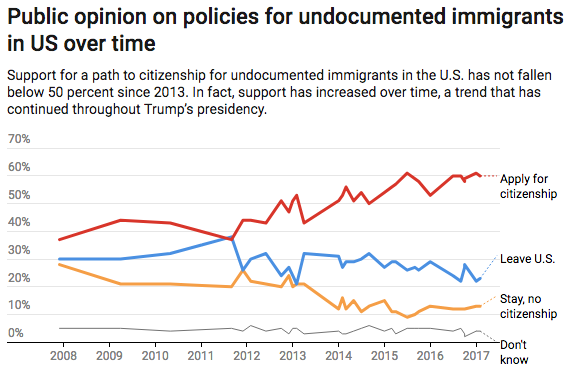Truthout is a vital news source and a living history of political struggle. If you think our work is valuable, support us with a donation of any size.
Lawmakers in Washington, from the president down to first-term members of Congress, may be misjudging how the public feels about immigration.
President Donald Trump appears to believe the country needs and wants hard-line policies. Members of Congress haven’t stopped him from carrying out those policies.
Do the American people really support them?
It turns out that government officials who think the majority of Americans want hard-line immigration policies are wrong.
Elected officials – both Republican and Democratic – tend to think that their constituents are more conservative than they actually are on immigration and other issues. Moreover, recent research suggests that Republican constituents have been more likely to contact their elected officials than Democratic constituents.
Yet, my research on public opinion about immigration, and that of other social scientists, shows that the American public is supportive of more welcoming immigration policies. Welcoming policies might include a pathway to citizenship for undocumented immigrants, accepting more asylum claims or allowing the use of multiple languages in public places.
Most Americans Support a Path to Citizenship
I am a scholar of public opinion about immigration and national identity, and I have studied how people from a variety of backgrounds feel about immigration-driven diversity in the United States.
Let’s look at public opinion on one immigration proposal that has been debated for over a decade: providing a path to citizenship for undocumented immigrants living in the US.
Since late 2007, polls conducted by CBS and The New York Times have asked respondents which option they prefer when it comes to “illegal immigrants working in the United States.” The options include: allow them to stay in their jobs and eventually apply for US citizenship; allow them to stay only as guest workers but not apply for citizenship; or require them to leave their jobs and the country.

This question has been asked in 31 CBS/New York Times surveys since 2007. In 22 of them, providing a path to citizenship is the majority preference. Support for citizenship has not fallen below 50 percent since 2013. In fact, support has increased over time, a trend that has continued throughout Trump’s presidency.

Support for a path to citizenship varies by one’s background when it comes to race, gender, education, income, party and ideology. However, support is high across the board, even among those who say they are Republican or conservative.
Of course, this is only one of many immigration policies getting attention these days, and support for other policies varies.
Attitudes on this policy show that Americans are not as divided or as conservative as the discourse coming out of Washington, DC might reflect and is becoming even more supportive of the welcoming approach. Yet, providing a path to citizenship is also the primary policy that seems to keep thwarting legislative reform in Congress.
A Welcoming Climate Need Not Alienate US-Born Whites
Public officials may be concerned about alienating non-immigrant whites if they pursue welcoming immigration policies. We tried to find out whether that alienation could happen. In a recent experiment, my colleagues and I asked US-born whites in Arizona and New Mexico how they felt about their state adopting more welcoming or restrictive immigration policies.
We asked people if the proposed policy would make them angry, sad or happy. We found that liberal and moderate whites responding to the more welcoming treatment were more likely to be happy and less likely to be angry or sad than were those who were responding to the restrictive treatment.
We also asked them if the proposed policy would make them feel more or less at home and more or less likely to want to move. Again, we found that liberal and moderate whites, in response to the welcoming treatment, felt more at home and less likely to want to move than did liberal and moderate whites who were given the unwelcoming treatment.
Only conservative whites were happier, less angry, less sad and felt more at home in response to restrictive treatment. Every one else fared better when told that their state was considering adopting policies that welcomed immigrants.
It is worth noting that in the 2016 data mentioned above, only 35 percent of whites identified as conservative while 65 percent identified as either liberal, moderate or other.
Squeaky Wheel Gets the Grease
Given these data, why is a conservative approach to immigration dominating in Washington?
In American politics, it is the squeaky wheel that gets the grease. Within the Republican Party, which holds a majority of seats in Congress, voters with more conservative preferences on immigration and other issues have been more active in recent years than other party members. As long as that continues to be the case, Republican politicians will feel that they need to push restrictive immigration policies if they wish to remain in office, even if the majority of their constituents feel otherwise.
As more and more people respond to President Trump’s immigration agenda with protests and participation in electoral politics, this asymmetry in engagement may change.
A terrifying moment. We appeal for your support.
In the last weeks, we have witnessed an authoritarian assault on communities in Minnesota and across the nation.
The need for truthful, grassroots reporting is urgent at this cataclysmic historical moment. Yet, Trump-aligned billionaires and other allies have taken over many legacy media outlets — the culmination of a decades-long campaign to place control of the narrative into the hands of the political right.
We refuse to let Trump’s blatant propaganda machine go unchecked. Untethered to corporate ownership or advertisers, Truthout remains fearless in our reporting and our determination to use journalism as a tool for justice.
But we need your help just to fund our basic expenses. Over 80 percent of Truthout’s funding comes from small individual donations from our community of readers, and over a third of our total budget is supported by recurring monthly donors.
Truthout has launched a fundraiser to add 340 new monthly donors in the next 5 days. Whether you can make a small monthly donation or a larger one-time gift, Truthout only works with your support.
